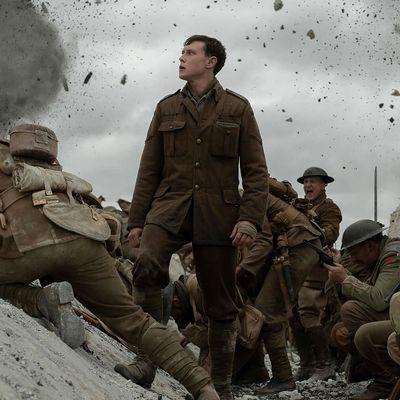
Our Oscar Futures column is off this week, but with Sam Mendes’s 1917 storming into the race this weekend like a company of German Stoßtruppen, it didn’t seem right to wait a whole two weeks to talk about it. Early reactions to Saturday’s screenings have been as enthusiastic as the British Expeditionary Force in the fall of 1914, with TCM’s Dave Karger calling the film “a masterful study of suspense, artistry, and timing,” and Awards Circuit’s Clayton Davis heralding it as “the best war film since Saving Private Ryan.” Will they, like so many members of the Lost Generation, later regret going over the top? Let’s run down the movie’s chances — will its awards-ceremony invitations be home by Christmas, or will Mendes be in for a bitter Steckrübenwinter?
On a purely technical level, there are few contenders in this year’s field that can match 1917. (With the caveat, of course, that I haven’t yet seen Cats.) The film follows two British soldiers in the First World War, tasked with crossing No Man’s Land to deliver a message that will call off a doomed attack. But in this particular case, story clearly is secondary to style: As you’ve probably heard, the film takes place in near-real time, stitched together to look like one single take. It’s shot by Roger Deakins, who became the presumptive front-runner in Best Cinematography as soon as the film’s trailer was released. I do not expect that to change: Besides the sheer length of his shots, Deakins also fills the frame with incredible imagery, including a burning church that lets him indulge his penchant for silhouettes, and a brief forest interlude that could have been smuggled in from a Terrence Malick film. And he controlled the camera from a van that was often hundreds of yards away from the actual filming! Gold Derby currently has his chances of taking home his second trophy at 20 percent. I would go even higher. It will be a major surprise if Deakins does not win.
A technical achievement like this should also play well in Best Director, which usually goes for this kind of self-consciously rigorous filmmaking. However, one big potential quagmire looms: the notion that Mendes is merely following tracks laid down by previous films. 1917 has the “race against time” plotting of Dunkirk, the single-minded forward momentum of The Revenant, and the one-take aesthetic of Birdman, and there are aspects of Gallipoli as well. Accordingly, Mendes at the post-screening Q&A took great pains to dispel any comparisons viewers might have been making: Of all his films, he said, 1917 was the one where he “looked least to other movies.” He added, “You can’t base movies on other movies.” On the plus side, these are all stylistic elements that have proved very popular with the Academy in the past, and while there are surely some voters who will feel like they’ve seen it all before, I can also imagine others responding to cinematic tricks they’ve always loved. Is a meal less delicious when you have it a second time?
While we’re on the subject of potential handicaps, I should also mention some advantages 1917 has over its predecessors. The first? Actual characters. While all the actors in Dunkirk were functionally indistinguishable, the two protagonists of 1917 are clearly drawn: Dean-Charles Chapman’s Blake is a cheerful naïf, his round cheeks and puppy-dog eyes suggesting a fundamental innocence; George MacKay’s Schofield is more hardened, with a perpetual thousand-yard stare that marks him as a war-weary veteran. They’re essentially the only characters; the other big names in the cast — Colin Firth, Benedict Cumberbatch, Mark Strong, Richard Madden, and Hot Priest — all get a single scene to pop up, do their thing, then depart. They’re stock characters, sure, but it’s a more emotionally accessible use of actors than the ciphers of Dunkirk, and it pays off when MacKay in particular comes in for a brutal amount of punishment. I don’t anticipate anyone in the cast cracking the acting races, but having faces an audience can anchor onto could help the film’s overall chances with voters in the acting branch, the largest in the Academy.
And while Dunkirk, like most of Nolan’s films, often felt like a meticulously constructed puzzle, 1917 has slightly more of an emotional angle to sell. The film closes with a dedication to Mendes’s grandfather, a WWI veteran who would regale young Sam with stories from the Western Front. That slightly personal touch could help the film from feeling like a purely technical exercise, as well as give Mendes a heartwarming campaign narrative.
The film should also be strong in the crafts categories, with Thomas Newman’s score, the sound and production design, and the visual effects looking like solid entrants. Editing is maybe another story, as that branch tends to embrace elegant cutting over single-take gambits. The screenplay, by Mendes and Krysty Wilson-Cairns, is probably a miss as well; it’s slightly talkier than Dunkirk or The Revenant, but not by much. Add it all together, and the film should be a strong all-around contender. A mark like Dunkirk’s eight noms — including nods in Picture and Director — feels like a reasonable ceiling of expectations. The Best Picture race remains fuzzy, and we may be in for a multipolar year like 2017, where the field never narrows down to one or two films. Even that year, though, Dunkirk had trouble pulling in wins, and I’d be hesitant before predicting 1917 to do what it and The Revenant couldn’t. But either way, I don’t think Verdun talking about this one.


